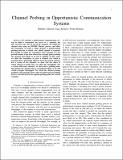Channel Probing in Opportunistic Communication Systems
Author(s)
Keslassy, Isaac; Johnston, Matthew Ryan; Modiano, Eytan H
DownloadchannelProbing copy.pdf (654.6Kb)
OPEN_ACCESS_POLICY
Open Access Policy
Creative Commons Attribution-Noncommercial-Share Alike
Terms of use
Metadata
Show full item recordAbstract
We consider a multi-channel communication system in which a transmitter has access to M channels, but does not know the state of any of the channels. We model the channel state using an ON/OFF Markov process, and allow the transmitter to probe a single channel at predetermined probing intervals to decide over which channel to transmit. For models in which the transmitter must transmit over the probed channel, it has been shown that a myopic policy probing the channel most likely to be ON is optimal. In this paper, we allow the transmitter to select a channel over which to transmit that is potentially different from the probed channel. For a system of two channels, we show that the choice of which channel to probe does not affect the throughput. For a system with many channels, we show that a probing policy that probes the channel that is the second-most likely to be ON results in higher throughput. We extend the channel probing problem to dynamically choose when to probe based on probing history, and characterize the optimal probing policy for various scenarios.
Date issued
2017-06Department
Massachusetts Institute of Technology. Department of Aeronautics and Astronautics; Massachusetts Institute of Technology. Department of Electrical Engineering and Computer ScienceJournal
IEEE Transactions on Information Theory
Publisher
Institute of Electrical and Electronics Engineers (IEEE)
Citation
Johnston, Matthew, et al. “Channel Probing in Opportunistic Communication Systems.” IEEE Transactions on Information Theory, vol. 63, no. 11, Nov. 2017, pp. 7535–52.
Version: Original manuscript
ISSN
0018-9448
1557-9654